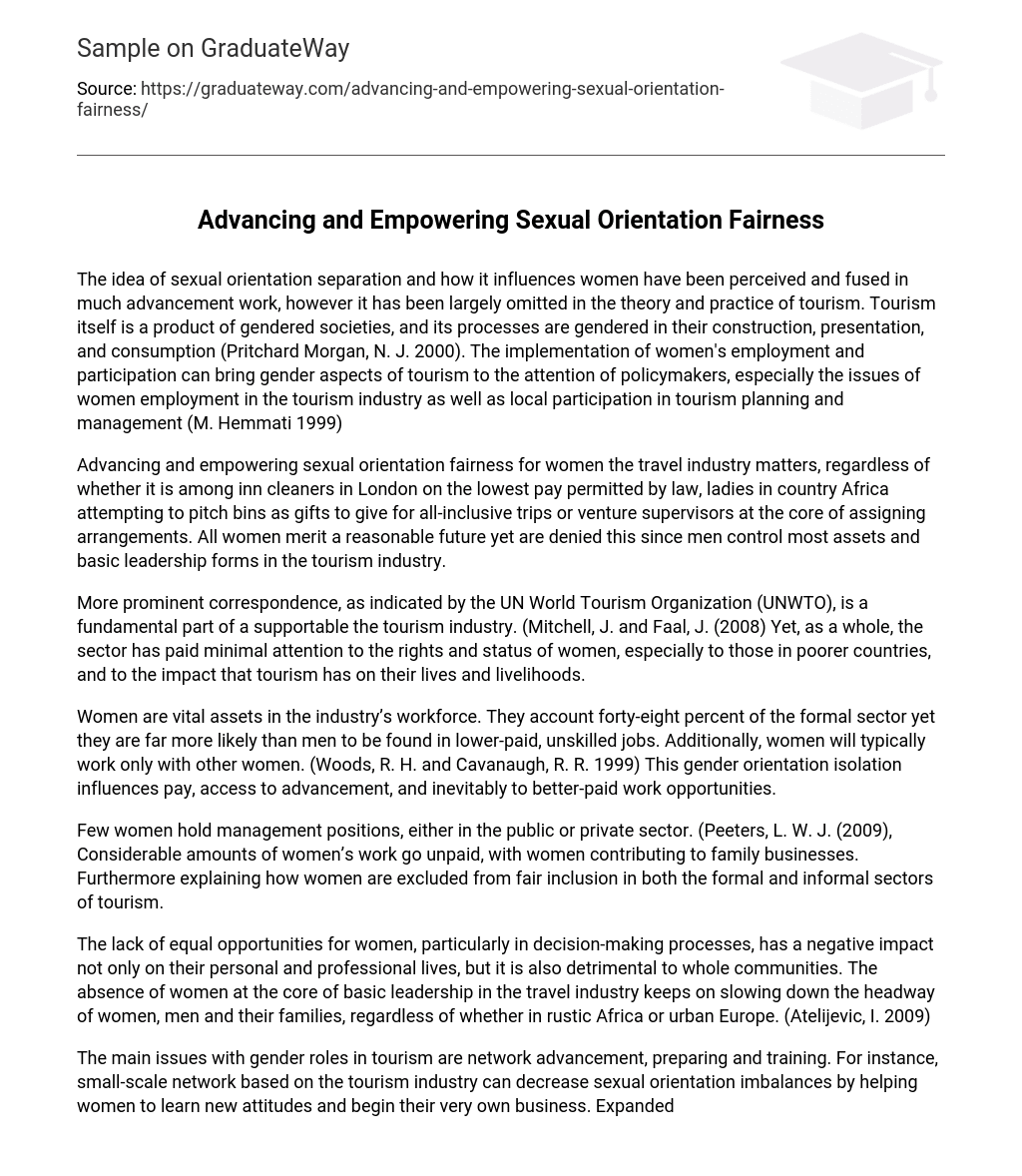The idea of sexual orientation separation and how it influences women have been perceived and fused in much advancement work, however it has been largely omitted in the theory and practice of tourism. Tourism itself is a product of gendered societies, and its processes are gendered in their construction, presentation, and consumption (Pritchard Morgan, N. J. 2000). The implementation of women’s employment and participation can bring gender aspects of tourism to the attention of policymakers, especially the issues of women employment in the tourism industry as well as local participation in tourism planning and management (M. Hemmati 1999)
Advancing and empowering sexual orientation fairness for women the travel industry matters, regardless of whether it is among inn cleaners in London on the lowest pay permitted by law, ladies in country Africa attempting to pitch bins as gifts to give for all-inclusive trips or venture supervisors at the core of assigning arrangements. All women merit a reasonable future yet are denied this since men control most assets and basic leadership forms in the tourism industry.
More prominent correspondence, as indicated by the UN World Tourism Organization (UNWTO), is a fundamental part of a supportable the tourism industry. (Mitchell, J. and Faal, J. (2008) Yet, as a whole, the sector has paid minimal attention to the rights and status of women, especially to those in poorer countries, and to the impact that tourism has on their lives and livelihoods.
Women are vital assets in the industry’s workforce. They account forty-eight percent of the formal sector yet they are far more likely than men to be found in lower-paid, unskilled jobs. Additionally, women will typically work only with other women. (Woods, R. H. and Cavanaugh, R. R. 1999) This gender orientation isolation influences pay, access to advancement, and inevitably to better-paid work opportunities.
Few women hold management positions, either in the public or private sector. (Peeters, L. W. J. (2009), Considerable amounts of women’s work go unpaid, with women contributing to family businesses. Furthermore explaining how women are excluded from fair inclusion in both the formal and informal sectors of tourism.
The lack of equal opportunities for women, particularly in decision-making processes, has a negative impact not only on their personal and professional lives, but it is also detrimental to whole communities. The absence of women at the core of basic leadership in the travel industry keeps on slowing down the headway of women, men and their families, regardless of whether in rustic Africa or urban Europe. (Atelijevic, I. 2009)
The main issues with gender roles in tourism are network advancement, preparing and training. For instance, small-scale network based on the tourism industry can decrease sexual orientation imbalances by helping women to learn new attitudes and begin their very own business. Expanded financial status can result in enhanced training for women. Comparable discoveries are discussed by (Scheyvens 2002). In any case, far less research has been led on the usage, implementation, and advancement of the travel industry related enactment that bargain.
The airline industry is an example of a segregated sector. Women dominate deals, ticketing, and flight chaperon positions, while the dominant part of airline CEOs, supervisors, and pilots are men. In numerous countries, visit managing also known as tour guiding is another region that has been difficult for women to enter. Visit managing is regularly viewed as a lucrative career opportunity in foreign countries because of the generous tips are given by outside sightseers. In most countries the profession is male-dominated, and women tour guides have faced discrimination. (International Labour Organization 2002)
Women are overly represented in the informal sector. Sixty percent of women in developing countries are in non-agricultural informal employment eighty four percent in Sub Saharan Africa, eight six percent in Asia and fifty-eight in Latin America. Females are overrepresented in low-status employments, frequently treated unequally or put in cliché occupations, and powerless against sexual segregation and abuse.
In conclusion, the requirement for insights on gender impacts in the tourism industry requires a gender analysis in the thinking, development, practice, and evaluation of tourism. Without a gender dimension and a reframing of policies, any attempts to build sustainable tourism policies and business will be ineffective. (Richter, L. K. 1995)
References
- Pritchard, A., & Morgan, N. J. (2000). Constructing tourism landscapes – Gender, sexuality, and space.
- M. Hemmati (1999) Gender and tourism: women’s employment and participation in tourism
- World Economic Forum (2010), Global Gender Gap Report, 2010, World Economic Forum, Geneva.
- Peeters, L. W. J. (2009), Baseline Research Agenda, UNWTO Taskforce Women Empowerment in Tourism, Madrid
- Woods, R. H. and Cavanaugh, R. R. (1999), Gender Discrimination and Sexual Harassment as Experienced by Hospitality
- International Labour Organization (2002), Women and Men in the Informal Economy: A Statistical Picture, ILO, Geneva
- International Society of Women Airline Pilots, www.iswap.org.
- Atelijevic, I. (2009), Women Empowerment in Tourism: Analysis in Africa, Latin America, and Southeast Asia, UNWTO and Wageningen University.
- MWTGA (2009) “No Room Share” Campaign, press release by Malaysian Women Tourist Guides Association (MWTGA)
- Richter, L. K. (1995), Gender, Race: Neglected Variables in Tourism Research pp. 391-404





